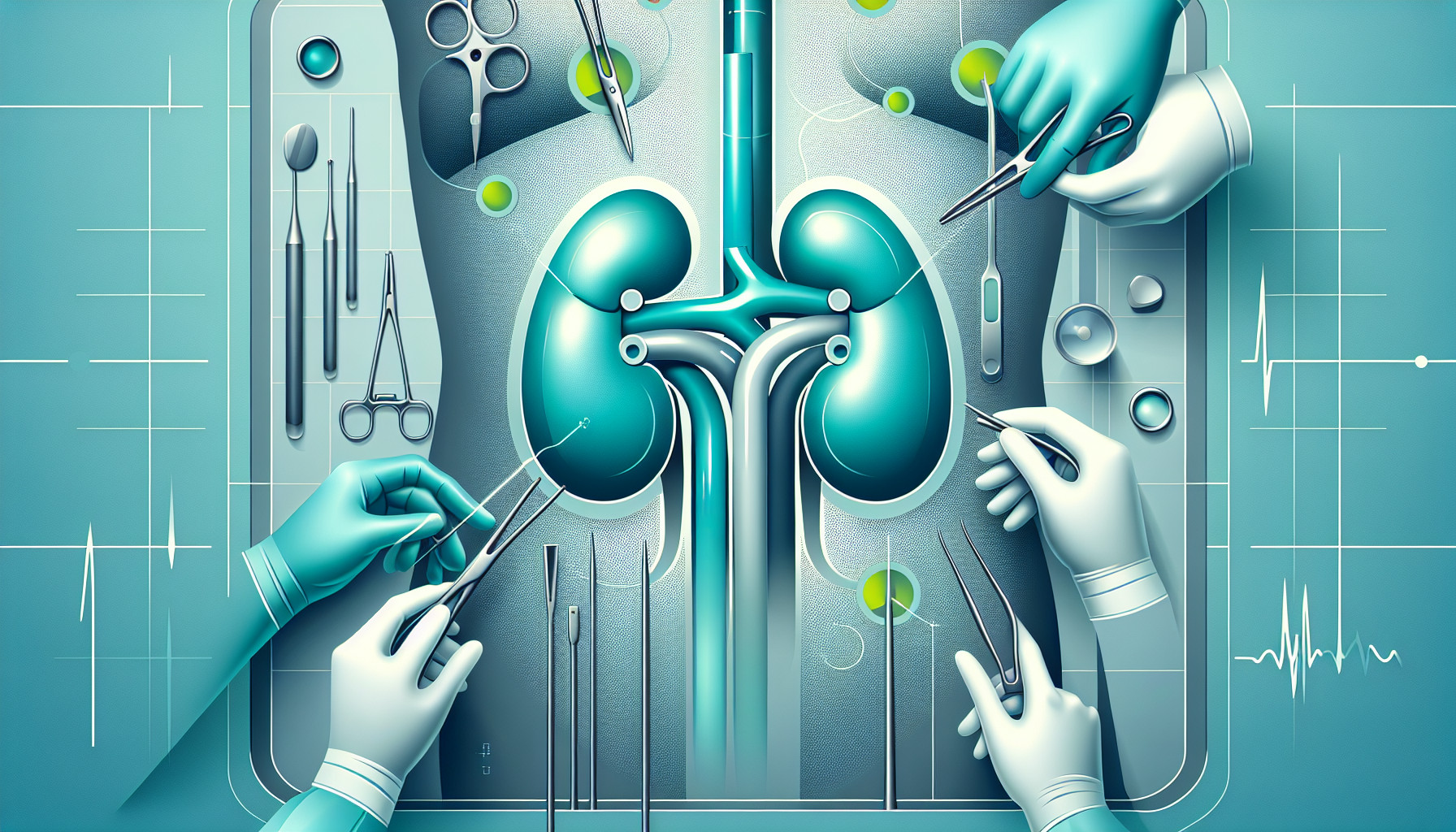Our Summary
This research paper is about the complications that arise when a woman waiting for a kidney transplant tests positive for pregnancy. A positive pregnancy test can postpone or cancel the operation, especially if the donor is deceased. However, it’s known that some groups, such as women nearing menopause and patients with chronic kidney disease, can have elevated levels of the pregnancy hormone (human chorionic gonadotrophin or hCG) even if they are not pregnant. The researchers discuss a case of a woman who was set to receive a kidney transplant and tested positive for pregnancy, but with low levels of hCG. After further testing, they went ahead with the transplant. The paper then discusses how to handle similar situations in the future.
FAQs
- Can a positive pregnancy test affect a kidney transplant operation?
- How does the level of pregnancy hormone (hCG) affect patients with chronic kidney disease or women nearing menopause?
- What steps were taken when a woman set to receive a kidney transplant tested positive for pregnancy but with low levels of hCG?
Doctor’s Tip
A helpful tip a doctor might tell a patient about kidney transplant is to carefully follow all pre-transplant instructions provided by the medical team, including any necessary testing such as pregnancy tests. It is important to communicate openly and honestly with your healthcare provider about any potential factors that may affect the transplant process, such as the possibility of a false positive pregnancy test. By working closely with your medical team and staying informed about your care, you can help ensure a successful transplant outcome.
Suitable For
Patients who are typically recommended for kidney transplant are those with end-stage kidney disease, also known as kidney failure. This can be caused by various factors such as diabetes, high blood pressure, glomerulonephritis, or polycystic kidney disease. Patients who are on dialysis and have a decreased quality of life due to their kidney function are also candidates for kidney transplant.
In addition, patients who are relatively young and otherwise healthy are good candidates for kidney transplant. This is because younger patients tend to have better outcomes post-transplant compared to older patients. Patients who do not have any significant medical conditions that would increase the risk of complications during or after the transplant surgery are also recommended for kidney transplant.
It is important for patients to undergo a thorough evaluation by a transplant team to determine if they are suitable candidates for kidney transplant. This evaluation includes assessing the patient’s overall health, any medical conditions they may have, and their ability to follow the necessary post-transplant care plan. Patients who are compliant with their medications and follow-up appointments are more likely to be successful candidates for kidney transplant.
Ultimately, the decision to recommend a patient for kidney transplant is based on their individual medical history, overall health, and likelihood of benefiting from the transplant. It is important for patients to work closely with their healthcare providers to determine the best treatment option for their kidney disease.
Timeline
Before kidney transplant:
- Patient is diagnosed with kidney failure and is placed on the waiting list for a transplant.
- Patient undergoes various tests and evaluations to determine their suitability for a transplant.
- A suitable donor is found, either living or deceased.
- Patient and donor undergo pre-transplant evaluations and tests to ensure compatibility.
- Surgery date is scheduled and preparations are made for the transplant procedure.
After kidney transplant:
- Patient undergoes the transplant surgery, which typically lasts several hours.
- Patient is closely monitored in the hospital for any complications or signs of rejection.
- Patient is discharged from the hospital and begins a regimen of immunosuppressant medications to prevent rejection of the new kidney.
- Patient attends regular follow-up appointments with their healthcare team to monitor the function of the new kidney and adjust medications as needed.
- Patient may experience some side effects from the medications, such as increased risk of infections or other complications.
- With proper care and monitoring, the transplanted kidney can potentially last for many years, improving the patient’s quality of life.
What to Ask Your Doctor
- Can a positive pregnancy test affect my eligibility for a kidney transplant?
- What further testing can be done to determine if the pregnancy is viable or if it is a false positive?
- How will a positive pregnancy test impact the timing of the transplant surgery?
- Are there any risks to me or the potential baby if I proceed with the transplant while pregnant?
- How will pregnancy affect my recovery and long-term outcome after the transplant?
- What are the options if the pregnancy test is confirmed to be positive?
- How will pregnancy affect my overall kidney function and health in the long term?
- Are there any specific precautions or medications I should take if I am pregnant post-transplant?
- How will pregnancy impact my risk of rejection or other complications after the transplant?
- What support or resources are available for pregnant patients undergoing a kidney transplant?
Reference
Authors: Yadav K, Doddi S, Sindhwani P, Nadiminty N, Malhotra D, Ratnam S, Rees M, Ekwenna O, Kaw D. Journal: Transplant Proc. 2022 Jul-Aug;54(6):1612-1614. doi: 10.1016/j.transproceed.2022.04.018. Epub 2022 Jul 3. PMID: 35794047
